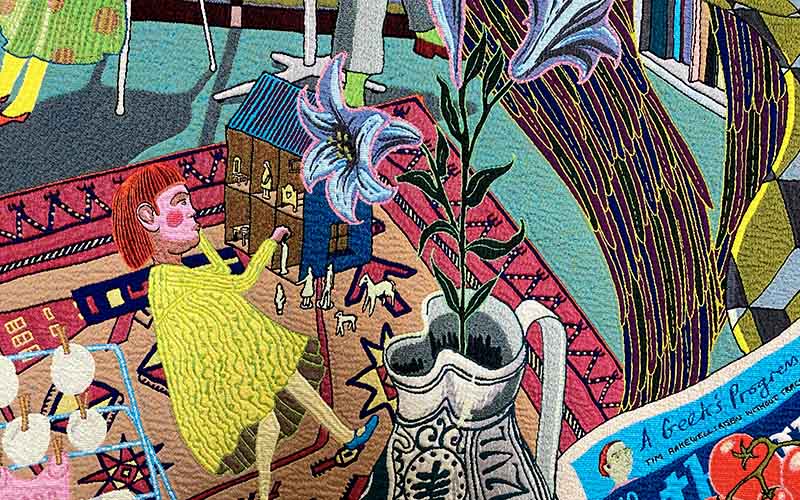Each of the 2m x 4m tapestries, inspired by William Hogarth’s The Rake’s Progress, charts a stage in the ‘class journey’ made by young Tim Rakewell (a wry reference to Tom Rakewell, Hogarth’s protagonist) and includes many of the characters, incidents and objects Grayson Perry encountered on journeys through Sunderland, Tunbridge Wells and The Cotswolds when filming a series for Channel 4.
Cleverly and unflinchingly, Perry exposes layers of unconscious tastes or biases in the scenes and individuals he portrays. References to classical art and religious painting also inform the work, bringing, in some cases, a reverence to an otherwise mundane scene or adding an extra layer of meaning.
The tapestries have toured extensively over the last few years, but this is the first time that they can be seen in an ecclesiastical setting, which opens up a great opportunity for the Cathedral to create a dialogue around the subject matter. Tapestry is one of the oldest forms of woven textile and became popular in Europe during the 14th century, when it was used to decorate both private and public spaces. It is an artform the Cathedral’s early custodians would have been familiar with and was employed to bring religious stories to life and depict historical events. Tapestries also performed the very practical role of insulating drafty medieval spaces.

Welcoming The Vanity of Small Differences to the Cathedral, The Very Revd Nicholas Papadopulos, Dean of Salisbury, said: “Perry’s subject in this sequence is social class, and the myriad ways in which not only economic factors but also habits and tastes differentiate human beings one from another. This can be challenging. Perry asks us to see ourselves as others may see us, and he also asks us to acknowledge the ways in which we judge others. This, I believe, is worthy of exploration in a Cathedral context. Self-questioning and self-reflection are vital disciplines in the life of faith, just as welcoming and honouring people from every walk of life is part of our vocation as a place of prayer and worship and as a place which is visited by thousands.”
Artist Grayson Perry said: “I am hugely pleased and proud that The Vanity of Small Differences is being shared by the Arts Council and British Council Collections in this way. The work has travelled all around the country and the world – and now to Salisbury Cathedral, for this first showing in a religious space. It was conceived as a public artwork, and I wanted to see them shared with very wide and varied audiences. My hope remains that for those visiting the exhibition in Salisbury Cathedral, it not only delights the eye and engages visitors, but also sparks debate about class, taste and British society.”

Beth Hughes, Curator, Arts Council Collection said: “It is 10 years since these tapestries were created and in all that time we have never shown them in a venue quite as awe-inspiring as Salisbury Cathedral. Rich in colour and content, it is Perry’s acutely observed attention to detail which draws you in. I’m sure we all have moments of familiarity as we look through this tableau of English life and see that mug we have at home and ask ourselves, which social class do I belong to? Arts Council Collection has a long history of taking art to unexpected places and we are thrilled to be able to share these bright and bold tapestries with the Cathedral’s visitors.”
Salisbury Cathedral is known for its contemporary art exhibitions, which are used to explore questions about contemporary society and faith as well as exhibit exceptional art. The Vanity of Small Differences exhibition comes by courtesy of the Arts Council Collection, Southbank Centre London and British Council, and by gift of the artist and Victoria Miro Gallery with the support of Channel 4 Television, the Art Fund and Sfumato Foundation with additional support from AlixPartners.
You can see the artwork until 25 September.